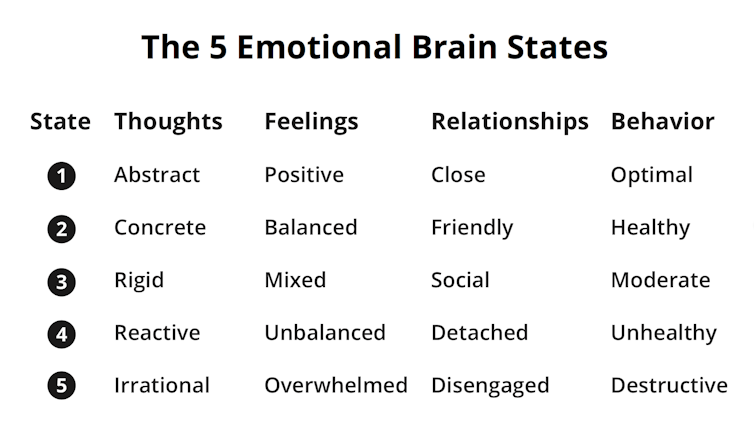
President Donald Trump and British Prime Minister Theresa May during NATO Summit 2018 in Brussels, Belgium. Alexandros Michailidis / Shutterstock.com
Reeling From The News? Train Your Brain To Feel Better With These 4 Techniques
The relentless news cycle has many people feeling overwhelmed and stressed, wondering how to calm their lives and stay healthy. Here are some tips from neuoscience that may help
Americans have been barraged in the past couple of weeks by a series of major news events – some of them unsettling. President Trump’s trip to Europe left many unsettled about the future of the decades-old U.S. relations with Europe, and a summit with Russia’s President Vladimir Putin left many uneasy when Trump did not forcefully back the findings of American intelligence agencies.
This all happens after hysteria on all sides over a Supreme Court nominee and a fountain of bad news about natural disasters, immigration issues, growing addiction rates, and a startling 30 percent increase in deaths of despair.
It doesn’t matter which side of the aisle you are on, or even if you have a side. The dangerous polarity and the rhetoric that catches fire is leaving many people feeling numb, discouraged, angry or lost. And yet, maybe this stress is beneficial in its own way, encouraging us to pause for long enough to update how we think about stress, in the spirit of changing the world by changing ourselves.
My colleagues and I at University of California San Francisco have developed an online program called emotional brain training (EBT) for improving the brain’s effectiveness in preventing and treating stress-induced problems, ranging from anxiety and depression to overeating and obesity.
Stress has been called the number one epidemic worldwide. Our stress response evolved to prepare us to respond to infrequent bouts of physical stress, not the life we live today, which is one of chronic emotional stress. The perceived instability and incoherence of people and institutions upon which we depend and the resultant sense of isolation and insecurity exacerbate that emotional stress. The overwhelmed brain can lock in a state of chronic stress, or a high allostatic load that causes the 75 percent to 90 percent of health problems stemming from stress. We have found that using these four brain-based techniques can train your brain to bounce back from stress more rapidly.
One: See stress as a moment of opportunity
One of the most effective ways to combat stress is to view it as a good thing.
This simple mental reset stops the secondary stress of ruminating about being stressed that can last for hours or days after we are triggered by a stressful situation.
What’s more, our old unconscious expectations that are stored in the emotional brain can block our creativity. Stressful moments open the brain to revising those expectations, so it’s easier to experience a breakthrough in a love relationship, a work project, or a new perspective on life. Through the portal of stress, the synaptic connections that link neurons to bring forward in time old expectations unlock. They become fluid so that fresh ideas can appear in our mind more readily.
The first technique to outsmart stress is to say to yourself, “Stress? Great! It’s a moment of opportunity!”
Two: Check your stress number
Another brain-based strategy to feel better is to check your brain’s stress level and assign a number to it. Instead of asking, “How do I feel?” or “Why did I do that?”, ask “What number am I?”
We use the EBT 5 Point system, with 5 being the highest level of stress. In a high stress state, or “Brain State 5”, the primitive, reptilian brain is in charge, and all aspects of life are ineffective and extreme.
At a low stress state, or “Brain State 1”, the lofty neocortex takes control and the various domains of life naturally become effective and balanced.
Checking brain states has important benefits such as helping us understand ourselves better and appreciate the commonalities of all people. Everyone experiences all five brain states.

The EBT 5 Point System for emotion regulation. Laurel Mellin,EBT
Three: Update your unconscious expectations
The third technique for detox is to update unreasonable expectations that are encoded in the brain from past experiences. They cause the brain to trigger a strong reaction to the daily news feed.
These emotional circuits can take the form of false generalizations, messages that may have been true at one moment, but the brain took them as a fact of life, such as “I have no power.” The rumbling stress of that message contributes to our stress.
Also, these unreasonable expectations can be false associations, crossed wires from a momentary experience of stress that we coped in some way that wasn’t healthy. The brain recorded that response and replays it in response to small daily stresses. If we reached for food when we really needed love, an expectation is automatically encoded, such as “I get my love from overeating” that prompts stress eating. If we feel distanced in a relationship, the encoded message may be “I get my safety from isolating,” spawning decades of distancing and hiding from loved ones. These expectations amplify our stress chemicals and promote reactivity and prolonged, unproductive stress.
Emerging research has shown that these circuits can be aroused, reactivated and updatedso they are reasonable. When we change them, the brain’s messaging begins promoting stress resilience, helping us bounce back from disturbing news more rapidly. Rewiring these unreasonable expectations has always been the focus of psychotherapy, however, reframing these expectations as emotional circuits has increased interest in using the brain’s power to change through self-directed neuroplasticity in clinical and wellness programs. The EBT technique for rewiring, which is called the “cycle tool”, applies this research with a set statements that guides users in both reducing their stress rapidly and updating their expectations. The key to using it is to state one phrase after another, and pause for long enough for the messages from the unconscious mind to “bubble up” into the conscious mind to complete the sentences.
The EBT Cycle Tool
This situation is …(complain about a situation) What I’m most stressed about is … (narrow it to one complaint) I feel angry that … I can’t stand it that … I HATE it that … I feel sad that … I feel afraid that … I feel guilty that … Of course, I would do that because my unreasonable expectation is … My reasonable expectation is … (repeat three times)
I’ll give an example. Here’s my cycle tool at this moment:
The situation is … the politicians are making a mess of things and the world is falling apart. What am I most stressed about is … the world is falling apart. I feel angry that the world is falling apart. I can’t stand it that you can’t trust anyone. I hate it they won’t do what I want them to do. I feel sad that … things are so bad. I feel afraid that … they will get worse … I feel guilty that I am so stressed out!
Of course, I am stressed out, because my unreasonable expectation is that I get my safety from … other people doing what I want them to do. That’s ridiculous! I cannot get my safety from others doing what I want them to do. That’s impossible. I get my safety from connecting with myself and doing what I can do to create safety and joy in my life.
In one to four minutes of using this emotional tool, I feel good again and appreciate that I have made a small but important improvement in my wiring.
Four: The power of compassion and humor
The fourth technique is to check the brain state of others. Problems in relationships are most apt to happen when both people are in more stressed states (Brain State 4 or Brain State 5). The reptilian brain is in charge, so not only are emotions extreme, but the brain activates circuits of relationship dysfunction, such as merging with others or distancing from them. Our thinking brain remains offline, so analyzing the situation rapidly devolves into obsessing or ruminating. We’re apt to distance ourselves from others and judge.

Humor helps. Via Shutterstock. From www.shutterstock.com
When stressed like this, nobody is “relationship material.” By realizing that your partner is in stress, you can access compassion and use humor (e.g., “I’d like to discuss that but my reptilian brain is in charge right now.”) to melt that stress and hasten a healing moment of reconnection.
Try a little tenderness
How can we boost our spirits during turbulent times? Let’s remind ourselves that the stress of the situation is perfect in its own way. It gives us opportunities to try a little tenderness, becoming more sophisticated in how we approach our emotions, thereby discovering a new zest for life. That zest becomes our gift to ourselves, to our loved ones – and to our nation.
![]()
This post originally appeared at The Conversation. Follow @ConversationUS on Twitter.






